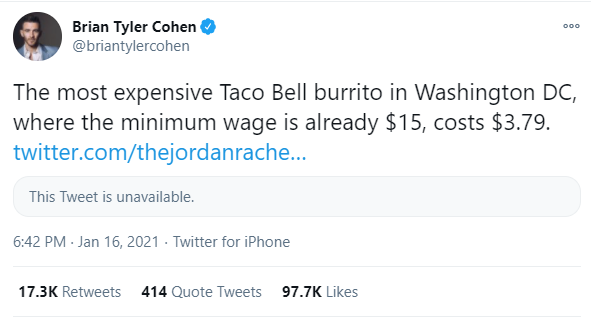Among the hotly contested list of Joe Biden’s promises is an increase of the federal minimum wage to an hour. There are plenty of sound reasons to oppose government minimum wage laws, but there is one objection making the rounds that is based on bad economics and should be avoided, and that’s the “businesses will pass on the costs to consumers” objection. For instance, a now deleted tweet by someone claiming that a minimum hourly wage will cause Taco Bell burritos to explode in cost was shot down in short order by the tweet below. Scrolling through the replies also shows hundreds of other similar responses from people in cities that already have a minimum wage. Indeed, the responses were so decisive and numerous that the original poster deleted his
Topics:
Bradley Thomas considers the following as important: 6b) Mises.org, Featured, newsletter
This could be interesting, too:
Nachrichten Ticker - www.finanzen.ch writes Die Performance der Kryptowährungen in KW 9: Das hat sich bei Bitcoin, Ether & Co. getan
Nachrichten Ticker - www.finanzen.ch writes Wer verbirgt sich hinter der Ethereum-Technologie?
Martin Hartmann writes Eine Analyse nach den Lehren von Milton Friedman
Marc Chandler writes March 2025 Monthly
Among the hotly contested list of Joe Biden’s promises is an increase of the federal minimum wage to $15 an hour.
There are plenty of sound reasons to oppose government minimum wage laws, but there is one objection making the rounds that is based on bad economics and should be avoided, and that’s the “businesses will pass on the costs to consumers” objection.
For instance, a now deleted tweet by someone claiming that a $15 minimum hourly wage will cause Taco Bell burritos to explode in cost was shot down in short order by the tweet below. Scrolling through the replies also shows hundreds of other similar responses from people in cities that already have a $15 minimum wage. Indeed, the responses were so decisive and numerous that the original poster deleted his tweet to avoid further embarrassment.
 Don’t make the same mistake.
Don’t make the same mistake.
There are two main reasons why the “but tacos or hamburgers at fast food joints will cost $10” argument is easily shot down. First, it is bad economics.
If Taco Bell or McDonalds could charge $10 per taco/burger, they already would be, regardless of wages and the costs of other inputs. But businesses can’t just unilaterally increase their prices without a response from customers. The law of demand tells us that consumers will demand more of a good at lower prices and less of it at higher prices, other things held equal. Taco Bell doesn’t charge $10 for a burrito, because customers won’t pay that price.
To illustrate this point, imagine if the government mandated a minimum price for beef of $15 per pound. Burger joints couldn’t just pass on the increased costs to customers, because the demand curve for burgers would not change. Instead, burger joints would buy less beef.
The mandated increase in beef prices would do nothing to improve the quality of the beef nor change the price customers are willing to pay for the finished product it’s used to make. To the extent that burger joints would still buy beef; they would need to cut costs elsewhere, on other inputs and expenses.
Fast-food restaurants would decrease their demand for beef and seek alternatives, maybe instead sell more chicken sandwiches or salads.
Some larger national chains might be able to absorb the added costs of beef by dispersing the spending cuts across many other inputs and across thousands of stores, so it would be smaller mom-and-pop shops that would be hit the hardest.
Now swap “low-skilled labor” for “beef.” Businesses can’t just “pass along” the higher input costs to customers. Government’s artificial raising of the price of an input will decrease the demand for that input, meaning that fewer low-skilled workers will have access to the important first rung of the career ladder.
Businesses will instead seek alternatives, like automated kiosks, that are more economical. Moreover, to the extent that businesses pay the increased minimum wage to employees that can’t be replaced, they will be forced to cut costs elsewhere, perhaps reducing fringe benefits, worker training programs, or even investments in workplace safety.
Moreover, warning against price increases in fast food or other goods provided by minimum wage workers misses the mark and exposes one to easy refutation. Changes in the costs of inputs, whether labor, raw materials, durable capital goods, or anything else, do not change the demand curve for the finished good for which they are used. So when minimum wages are increased, the change will not be reflected in noticeable price increases, allowing minimum wage advocates to say “see, we raised the minimum wage and McDonald’s hamburgers still only cost a couple bucks.”
Secondly, not only can your argument be easily dismissed on economic grounds, to the extent that minimum wage advocates accept the faulty notion that increased minimum wages will cause the prices of fast food and other low-priced goods to increase, but they can readily respond by saying they will happily pay a few cents more for a cheeseburger if it means the workers are paid a respectable wage.
Instead, we need to focus on the negative consequences of minimum wages on vulnerable, low-skilled workers, especially minorities. Follow the Horton rule: “Attack the right from the right, and the left from the left.”
 In the case of the minimum wage, we can address how, as Thomas Sowell has repeatedly pointed out, minimum wage laws have been a “disaster” for young and poor black people.
In the case of the minimum wage, we can address how, as Thomas Sowell has repeatedly pointed out, minimum wage laws have been a “disaster” for young and poor black people.
Not only is focusing on the negative impact minimum wage laws have on low-skilled, especially minority, people more economically accurate, it also makes for a much harder argument for progressives to counter. Minimum wage laws end up disproportionately harming the very people its advocates claim to be helping.
Like so many other harmful state interventions, minimum wage laws need to fought and repealed. To be successful, however, opponents must avoid falling into weak and easily refutable arguments.
Originally published by the Libertarian Institute.
Tags: Featured,newsletter








